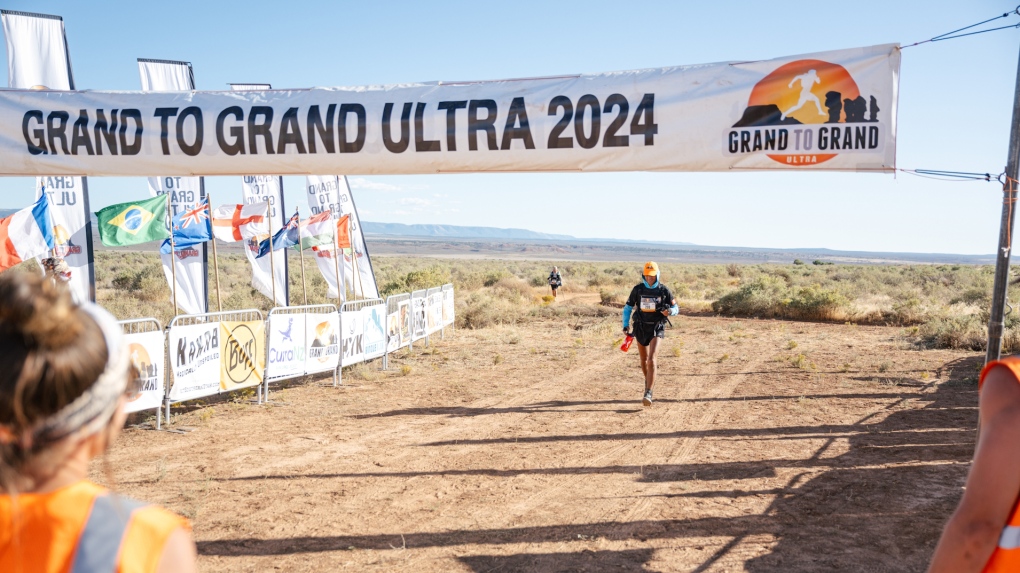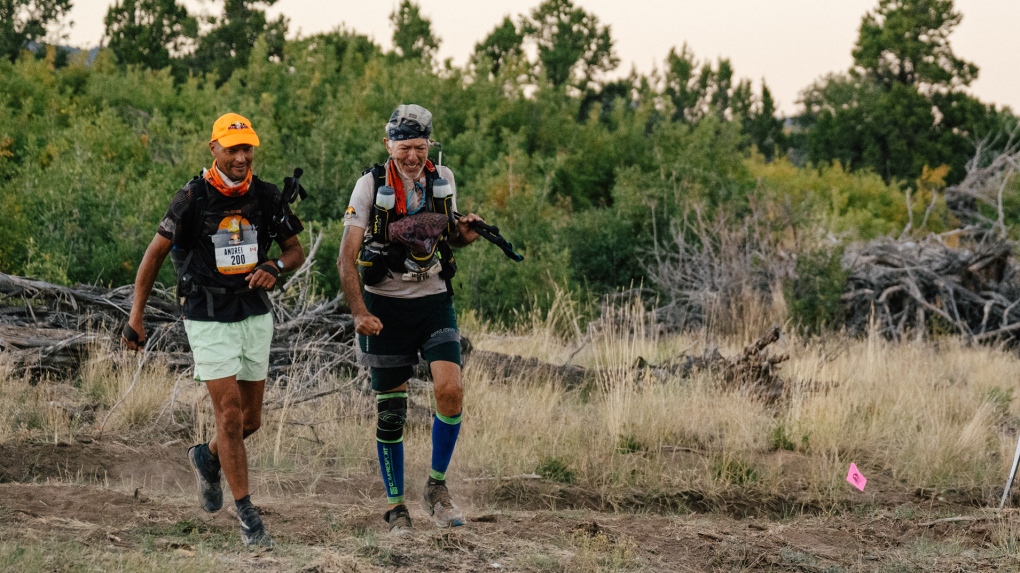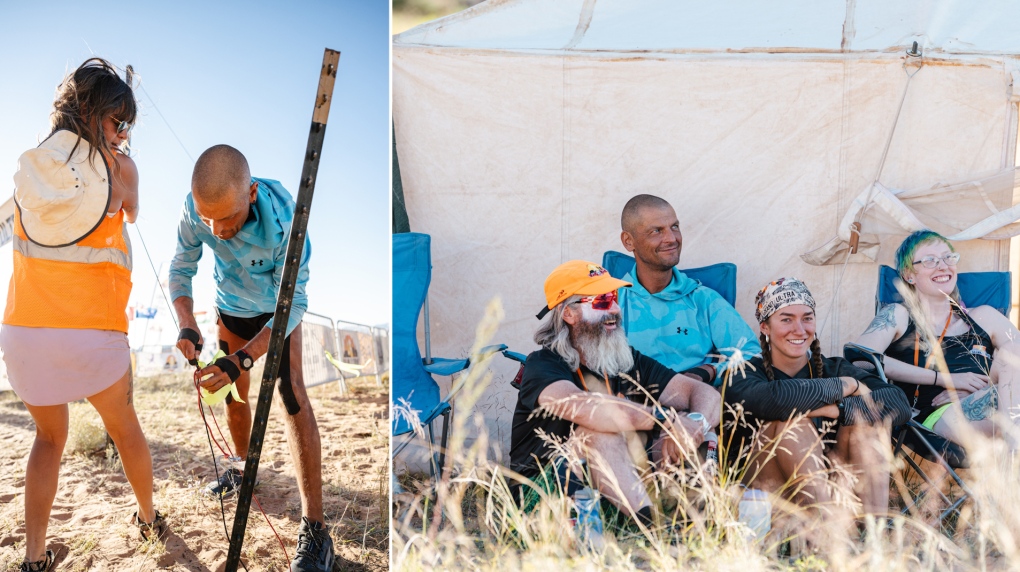Ontario man completes week-long marathon spanning 273 km after decade of volunteering
After a decade of volunteering for one of North America’s most punishing ultra marathons, an Ontario man decided to challenge himself by stepping up from the sidelines to become a participant.
Starting his journey on Sept. 22, Windsor’s Andrei Kovalevskii ran 273 kilometres over seven days as part of the 2024 Grand to Grand Ultra Marathon.
With a race time of around 78 hours, he took food and sleep breaks using the supplies he carried in a backpack throughout the race.
 (Source: Anastasia Wilde Photography)
(Source: Anastasia Wilde Photography)
"I'm not a professional athlete. I just wanted to test myself," said Kovalevskii, speaking with CTV News one week after completing the run.
For the past 10 years, Kovalevskii served as part of the camp crew for the Grand to Grand Ultra Marathon.
The Grand to Grand Ultra is a multi-stage, self-supported ultra marathon covering 273 kilometres (170 miles) over seven days, starting at the North Rim of the Grand Canyon in Arizona and ending at the Grand Staircase in Utah.
Runners cross diverse and rugged terrain, including deserts, canyons, and sand dunes, while carrying their own food, gear, and survival essentials in backpacks.
Rescues are a last resort and result in the automatic disqualification of participants, as they are expected to be self-sufficient and capable of managing most situations they encounter.
The Grand to Grand Ultra Marathon is considered one of the most gruelling ultra marathons in the world.
Kovalevskii said, as a volunteer, he often saw participants drop out.
"I’d see runners give up and I couldn’t understand it," he said. "How could you drop out when I saw elderly people finishing? I always thought, ‘What if I participated?’ Then, I'd be able to judge."
That thought stuck with him, eventually pushing him to commit to a year of training and sign up for the 2024 Grand to Grand Ultra.
Despite limited time to train due to his job as a real estate agent in Windsor, Kovalevskii gradually built up to running 20-kilometre stretches through Mic Mac Park.
“This wasn’t about winning. It was about testing my mental stamina and seeing how far I could push myself," he said.
Last Saturday, Kovalevskii finished the race after 78 hours of endurance running through desert heat and high-altitude landscapes.
 (Source: Anastasia Wilde Photography)
(Source: Anastasia Wilde Photography)
He said completing the Grand to Grand wasn’t just about physical endurance. As a long-time smoker, Kovalevskii used the marathon to quit smoking for good.
“For me, this race was a rehabilitation process,” he explained.
“I had been smoking for 30 years and tried everything to quit — patches, gums, you name it. But I knew if I did this race, completely off the grid with no access to cigarettes, I could finally break free.”
The wilderness setting provided the perfect environment for that, he added.
"When you're out there, carrying everything on your back, the last thing you want to crave is a cigarette — but I did. When I got lost at night, the stress hit me, and I wanted to smoke so badly, but I didn’t have one, and that got me through."
The Grand to Grand Ultra is considered one of the most challenging races in North America, with competitors enduring seven days of extreme conditions.
Each runner must be self-sufficient, carrying their own food, sleeping gear, and survival essentials across the 275-kilometre course.
"People quit for different reasons," he said. "Some just can’t handle it mentally, while others develop medical issues like blisters so bad they can’t walk."
This year, 38 out of 56 competitors completed the race.
“It’s not just about running,” Kovalevskii said. “It’s a quest. You’re following markers and, if you’re not paying attention, you can easily get lost."
"That happened to me during the 80-kilometre night stage. I missed a turn, lost about an hour and a half, and everyone who was behind me suddenly passed me."
Kovalevskii finished as one of only two Canadians to complete the 2024 race. He placed 34th with a race time of 72 hours, 8 minutes, and 29 seconds.
While many athletes rely on carbs to fuel their efforts, Kovalevskii — who said used the race to conduct a personal experiment with fasting and nutrition — switched to a keto diet and missed meals on purpose to see how his body would respond.
 (Source: Anastasia Wilde Photography)
(Source: Anastasia Wilde Photography)
“In seven days, I lost eight pounds, but the experiment taught me a lot about how my body responds under extreme conditions. I think it really accelerated my body’s healing process," he said.
“The day before the last stage, I skipped breakfast and lunch and ran 42 kilometres on an empty stomach."
As for what comes next, Kovalevskii is undecided.
“The first time I volunteered, I said I wouldn’t come back. Then I came back the next year and the year after that, for 10 years," he said.
"Now that I’ve run it, I think I will participate again. Maybe not next year. But it’s a different realm — mentally and physically."
CTVNews.ca Top Stories

opinion Tom Mulcair: Prime Minister Justin Trudeau's train wreck of a final act
In his latest column for CTVNews.ca, former NDP leader and political analyst Tom Mulcair puts a spotlight on the 'spectacular failure' of Prime Minister Justin Trudeau's final act on the political stage.
B.C. mayor gets calls from across Canada about 'crazy' plan to recruit doctors
A British Columbia community's "out-of-the-box" plan to ease its family doctor shortage by hiring physicians as city employees is sparking interest from across Canada, says Colwood Mayor Doug Kobayashi.
'There’s no support': Domestic abuse survivor shares difficulties leaving her relationship
An Edmonton woman who tried to flee an abusive relationship ended up back where she started in part due to a lack of shelter space.
opinion King Charles' Christmas: Who's in and who's out this year?
Christmas 2024 is set to be a Christmas like no other for the Royal Family, says royal commentator Afua Hagan. King Charles III has initiated the most important and significant transformation of royal Christmas celebrations in decades.
Baseball Hall of Famer Rickey Henderson dead at 65, reports say
Rickey Henderson, a Baseball Hall of Famer and Major League Baseball’s all-time stolen bases leader, is dead at 65, according to multiple reports.
Arizona third-grader saves choking friend
An Arizona third-grader is being recognized by his local fire department after saving a friend from choking.
Germans mourn the 5 killed and 200 injured in the apparent attack on a Christmas market
Germans on Saturday mourned the victims of an apparent attack in which authorities say a doctor drove into a busy outdoor Christmas market, killing five people, injuring 200 others and shaking the public’s sense of security at what would otherwise be a time of joy.
Blake Lively accuses 'It Ends With Us' director Justin Baldoni of harassment and smear campaign
Blake Lively has accused her 'It Ends With Us' director and co-star Justin Baldoni of sexual harassment on the set of the movie and a subsequent effort to “destroy' her reputation in a legal complaint.
Oysters distributed in B.C., Alberta, Ontario recalled for norovirus contamination
The Canadian Food Inspection Agency has issued a recall due to possible norovirus contamination of certain oysters distributed in British Columbia, Alberta and Ontario.


































